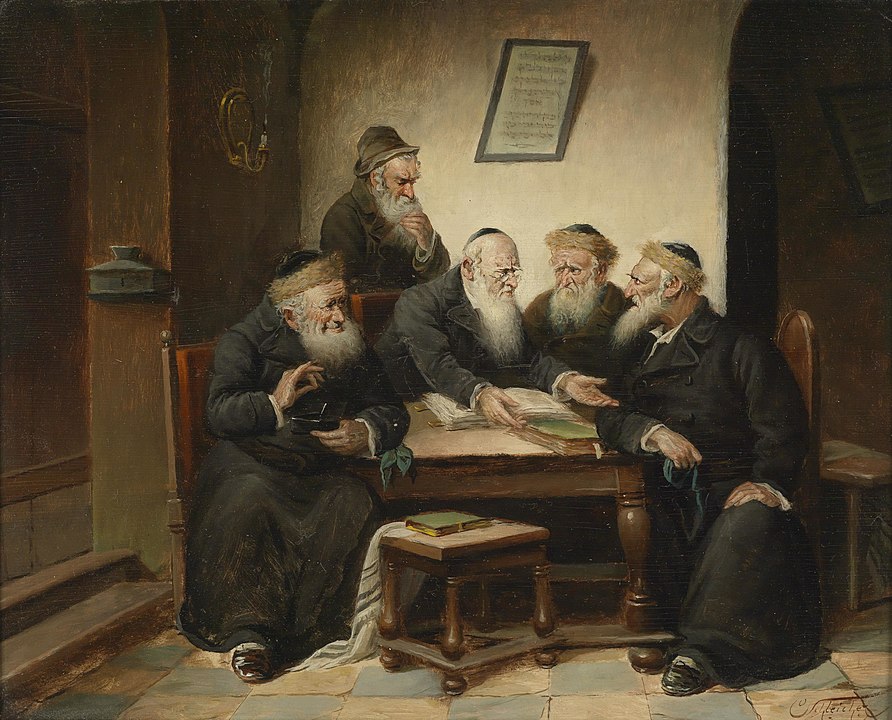In Christianity, the Messiah is front and center. But for most Jews, this isn’t something brought up on the regular. If anything, many will first start thinking about the topic only when asked by a Christian friend, “Do Jews believe that Jesus was the Messiah?” The answer to that is very straightforward:
“No.”
But the answer to the obvious follow up question is more complicated.
Prevalence of the Messiah

“Does Judaism believe in a Messiah—or, the Mashiach—at all?” Briefly, yes.
The Mashiach has figured prominently in Jewish consciousness since the very beginning… It’s discussed in the Bible. It’s talked about by a range of Jewish thinkers, from the ancient rabbis to Jewish philosophers, from mystic kabbalists to others who rejected mysticism. It’s seen throughout Jewish poetry. It’s a big part of the prayers. At the end of Shabbat, many Jews sing Eliahu Hanavi, a song asking for the Mashiach to come, the same Elijah we invite during the Passover Seder, representing our hope for him to bring the redemption of our people.
Debates around the Messianic Age

Anticipating the messianic age is a major theme in Judaism. Before answering why this belief continues to be crucial to our people, it’s good to first understand how the Messianic age is traditionally described in Judaism. The Mashiach is described as someone who will restore the land of Israel to the Jews, rebuild the temple, and create an age of global peace, bringing an end to all hatred and wars. Do all Jews today agree with all of this? Of course not, but these have been fundamental ideas in Judaism since antiquity.
And the fascination with these ideas continued in every generation. Some predicted the Messiah would come in their lifetime. Others contended it would be at the end of a six thousand year cycle. Would he be a military leader or a spiritual leader? Some debated if the Messianic era would be dependent on good deeds of the Jewish people and others argued God would create the Messianic era as a gift regardless of good deeds. Some argued that the details aren’t worth spending time on, as ultimately it’s unknowable. Others disagreed. They debated whether the Messianic age will be a mystical time, when even animals don’t fight, or will it be similar to our current reality, but better? Today, you have some movements that talk about the Mashiach in more metaphorical terms of working towards a better age – a Messianic age in the abstract.
Why is the Messiah a Core Belief?

When it comes to the debates over the specific beliefs surrounding the mashiach, we could spend a lot of time on that, getting into everything from Maimonides vs Nachmonides to the disputes where Jews debated with Christians, to the disagreements around a variety of Messianic figures who didn’t quite pan out – but let’s not. More than what are the debates, though, there’s a more fundamental question of “Why? Why have the Jewish People held on to this belief, in one form or another, for so long?”
There are many really important elements to being Jewish. We have food, practices, food, culture, food. All of these elements evolve over time—but fundamentally, they serve a similar purpose: to bind together a group of people into a cohesive whole.
And one of the most powerful tools in achieving that cohesiveness are the stories we tell ourselves about our shared history, and our beliefs about a shared future.
For a people who has spent so much of our time persecuted, the belief in a future Mashiach has always generated an unlikely optimism for what lay ahead. Amidst the dark times, the idea of the Mashiach was a light at the end of the tunnel. A rebellion against the bitterness of the present. It provided an answer to the question, “What are we working towards?” The answer was a better, more peaceful age. A return to Jerusalem. Amidst the troubles, and even horrors of a long and storied Jewish past, the Mashiach kept the Jews’ eyes trained on tomorrow.
How does belief in the Messiah impact us today?

But what about today? Do Jews believe in the idea of the Moshiach as they had in the past? Is it even possible to do so in an era in which Jewish life is flourishing like it hasn’t in a millennium? In a time in which we achieved sovereignty and a return to Jerusalem? How can we yearn for something we have already achieved, at least in part?
Well, different Jews feel differently about those questions. For some, the establishment of the State of Israel heralded the beginning of messianic times—in other words, we’re in it, as we speak! For others, despite the advent of the State of Israel, the Jews are still fundamentally in exile with no Mashiach in sight. Still, for some, the traditional belief in a specific Mashiach was translated to a more general belief in our responsibility to the future of humanity.
And different Jews focus on different methods for getting to that better age. For some, the focus is on doing good deeds such as visiting the sick and giving charity. For others it’s about learning Torah and prayer. For others it’s about correcting the injustices in the world and spreading Jewish values. But whatever the approach, they all stem from a similar place: a responsibility to take a proactive stance in making the world a better place than how we found it.
Why does Belief Matter?
Beliefs are tricky. They lie at the heart of what motivates each of us to follow the path we’re on and make certain decisions. They are our north star, guiding us from our shared history, into a shared future. Each of our beliefs plays a crucial role in who we are and what we do, even when those beliefs are not fully understood. And just as beliefs are so important to each of us individually, with the Jewish People, it’s only through powerful shared beliefs, like a Mashiach, that we’ve managed to thrive through the ages. To hold on to hope. And to continue to grow.
This series is part of a partnership with the Z3 Project. More about their work can be found here.
